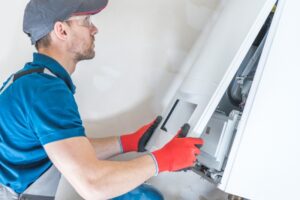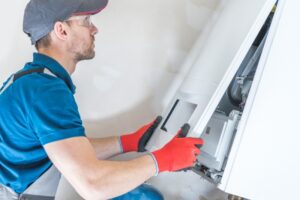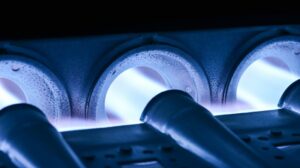You are ready for a new furnace in your Emerson, NJ home. However, trying to decode and navigate all the statistics on your various choices for heating installation can be bewildering, and without help you have a good chance of purchasing a furnace that will not only give you inadequate warmth, but will also perform inefficiently.
In this post, we’ll explain one of the most important stats to know about when picking a furnace: AFUE, which measures how efficient the heater uses burns a fuel to heat your home. However, you’ll need even more information than this to make the best choice, so call on DB Heating & Cooling for the assistance you will need.
AFUE = Annual Fuel Utilization Efficiency
AFUE stands for “annual fuel utilization efficiency,” and it is a measure of how effective combustion devices like furnace and boilers operate. Unlike a steady state, peak measure of heating efficiency, which is done over a short period, AFUE measures the average heat output over a full year.
AFUE is expressed as a percentage. The percentage is a measure of how much energy the furnace converts into useful heat. The higher the AFUE percentage, the less fuel the furnace wastes during the conversion. For example, for a mid-efficiency furnace that has an AFUE of 84%, the furnace creates 84 BTUs (British Thermal Units) for every 100 BTUs of natural gas put into it. This means a waste of only 16% of the available fuel.
Modern furnaces, especially natural gas furnaces, score high AFUE ratings. Older furnaces used to have only AFUE of 55-65%, but today many can score in the 90s. This is one of the reasons furnaces remain popular today for heating homes.
AFUE and selecting a furnace
Having a high-fuel efficiency furnace can means large energy savings. However, AFUE only measures the direct production of heat, and does not account for heat loss from other sources, such as from ducts and home insulation leaks. Therefore, although AFUE is an important factor in picking a furnace, it should not be the only factor. A high-efficiency furnace may save money with efficient heat, but that heating may not actually be effective. This is why you should have professional installers assist you in picking a furnace so that you get a model that will deliver you the combination of effective heating and efficient energy use that will work the best for you.
DB Heating & Cooling works on jobs both large and small when it comes to furnace installation in Emerson, NJ. We will help you find the furnace that will match your home and your family, and give you pleasant winters for many years to come.
Continue Reading
Tags: AFUE, Emerson, Furnace, Heating
Posted in Heating | Comments Off on AFUE: How Furnace Efficiency Is Measured
 A number of homeowners in our area choose an electric furnace over a gas-powered system due to their convenience and flexibility. After all, practically all homes are wired for electricity, so electric furnaces are a reliable option for any homeowner. They’re also a bit safer than gas furnaces since there are no hazards from toxic or combustible gases. That’s not to say that gas furnaces are inherently dangerous–just that this is a reason that many homeowners choose an electric furnace!
A number of homeowners in our area choose an electric furnace over a gas-powered system due to their convenience and flexibility. After all, practically all homes are wired for electricity, so electric furnaces are a reliable option for any homeowner. They’re also a bit safer than gas furnaces since there are no hazards from toxic or combustible gases. That’s not to say that gas furnaces are inherently dangerous–just that this is a reason that many homeowners choose an electric furnace!
 So it’s time for you to replace your current heating system. You’re considering a new furnace, but is gas the best choice for your fuel source, or should you go with an electric furnace? We can’t answer this definitively for you without hearing more about your specific needs and seeing your home, but we can certainly help you make an informed decision! Both furnace types have their pros and cons, and there are many factors to consider with both types.
So it’s time for you to replace your current heating system. You’re considering a new furnace, but is gas the best choice for your fuel source, or should you go with an electric furnace? We can’t answer this definitively for you without hearing more about your specific needs and seeing your home, but we can certainly help you make an informed decision! Both furnace types have their pros and cons, and there are many factors to consider with both types. In our last blog post, we covered some tips on
In our last blog post, we covered some tips on